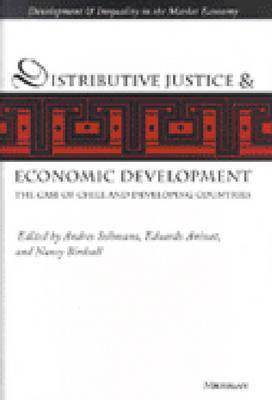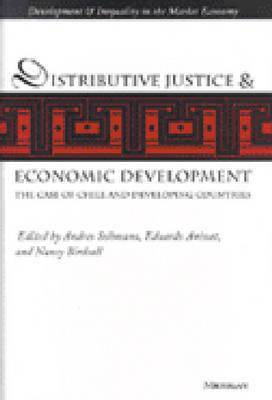
- Retrait gratuit dans votre magasin Club
- 7.000.000 titres dans notre catalogue
- Payer en toute sécurité
- Toujours un magasin près de chez vous
- Retrait gratuit dans votre magasin Club
- 7.000.000 titres dans notre catalogue
- Payer en toute sécurité
- Toujours un magasin près de chez vous
Distributive Justice and Economic Development
The Case of Chile and Developing Countries
109,45 €
+ 218 points
Description
The relationship between the process of creating wealth and distributing it has been a subject of great analytical and policy interest to development economists for many years. Is there an inevitable conflict, or tradeoff, between wealth creation and wealth distribution? Can both growth and social equity increase simultaneously? What role can public policy play to affect growth-equity outcomes?
These questions are particularly salient both for Latin America, where inequality levels are among the highest in the world, and for developing countries in general. A key question is to what extent market-oriented reform, followed with great impetus in the 1990s in the developing and postsocialist world, is compatible with socially accepted patterns of distribution of income, wealth, and opportunities.
Part 1 provides the analytical-empirical perspective. Contributors explore alternative concepts of distributive justice and social equity and their links with macro policies, structural reform, and human development. Part 2 is written mainly by Chilean policymakers, who examine Chile's economic reform started in the 1970s under a military regime and continued in the 1990s by the democratic regime. They describe the process of very rapid economic growth matched by significant poverty reduction and persistent wealth and income inequality.
Such a theme requires a dialogue between professional economists, social thinkers, and policy practitioners both at the national and international levels. This book provides that dialogue on the issues of social equity, distributive justice, and economic development and will be important reading for development economists and Latin American scholars.
Andrés Solimano is Director of the Country Management Unit for Colombia, Ecuador, and Venezuela at the World Bank. Eduardo Ananat is Minister of Finance of Chile. Nancy Birdsall is Chief of Policy and Research, Population Health and Nutrition Department at the World Bank.
These questions are particularly salient both for Latin America, where inequality levels are among the highest in the world, and for developing countries in general. A key question is to what extent market-oriented reform, followed with great impetus in the 1990s in the developing and postsocialist world, is compatible with socially accepted patterns of distribution of income, wealth, and opportunities.
Part 1 provides the analytical-empirical perspective. Contributors explore alternative concepts of distributive justice and social equity and their links with macro policies, structural reform, and human development. Part 2 is written mainly by Chilean policymakers, who examine Chile's economic reform started in the 1970s under a military regime and continued in the 1990s by the democratic regime. They describe the process of very rapid economic growth matched by significant poverty reduction and persistent wealth and income inequality.
Such a theme requires a dialogue between professional economists, social thinkers, and policy practitioners both at the national and international levels. This book provides that dialogue on the issues of social equity, distributive justice, and economic development and will be important reading for development economists and Latin American scholars.
Andrés Solimano is Director of the Country Management Unit for Colombia, Ecuador, and Venezuela at the World Bank. Eduardo Ananat is Minister of Finance of Chile. Nancy Birdsall is Chief of Policy and Research, Population Health and Nutrition Department at the World Bank.
Spécifications
Parties prenantes
- Editeur:
Contenu
- Nombre de pages :
- 216
- Langue:
- Anglais
- Collection :
Caractéristiques
- EAN:
- 9780472110865
- Date de parution :
- 24-01-00
- Format:
- Livre relié
- Format numérique:
- Genaaid
- Dimensions :
- 162 mm x 235 mm
- Poids :
- 489 g






